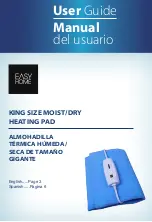
8
If you experience any ignition problem, turn off the heater and gas supply, and consult the troubleshooting
section of this manual.
Note: The burner may be noisy when initially turned on. To eliminate excessive noise from the burner, turn the
control knob to the “LOW” position, then turn the knob to the level of heat desired.
WHEN HEAR IS ON
Emitter screen will become bright red due to intense heat. The burner will display tongues of blue flame. These
flames should NOT be yellow or produce thick black smoke. This indicates an obstruction of airflow through the
burners.
OPERATION PRESSURE CHECKED
If the flame is very small, this is because the supply pressure is not enough to light.
1. Turn the control knob to the “OFF” position.
2.
Wait five minutes before attempting to relight the pilot.
3. Repeat steps beginning with step 2 in the lighting instruction section of this manual.
BEFORE LEAVING
1. Turn the control knob to the “OFF” position.
2. Never leave the patio heater unattended while in use.
SHUT DOWN INSTRUCTIONS
1. Push in and turn control knob clockwise to “OFF” position.
2. Disconnect the LP cylinder when heater is not in use.
Note: after use, some discoloration of the emitter screen is normal.
THE EVENT OF GAS LEAKAGE
1. Turn the control knob to “OFF” position
2. Wait 5 minutes to allow gas to dissipate
3. If odor continues, immediately call the gas supplier.
CAUTION:
Avoid inhaling fumes emitted form the heater’s first use. Smoke and odor from the burning of oils used in
manufacturing will appear. Both smoke and odor will dissipate after approximately 30 minutes. The heater
should NOT produce thick black smoke.
WARNING:
Heater will be hot after use; handle with extreme care.
BE CAREFUL! WHEN CERTAIN MATERIALS OR ITEMS ARE LEFT
ABOVE, BESIDE OR UNDER THIS HEATER WHILE IN USE. THEY
WILL BE SUBJECT TO RADIANT HEAT AND COULD BE SERIOUSLY
DAMAGED.
This heater is primarily used for the heating of outdoor patios,
decks, spas, pool and open working areas. Always make sure
that adequate fresh air ventilation is provided. Follow the spacing
tolerances as shown. The minimum clearances must be maintained
at all times. The installation must conform to local codes or in the
absence of local codes, with the standard for the storage and
handling of liquid petroleum gases, ANS/NFPA 58-1986. Or most
recent addition. For Canada, with the current CAN1-B149. The
heater must be placed on level firm ground. Never operate in an
explosive atmosphere. Keep away from areas where gasoline or
other flammable liquids or vapors are stored or used.
Summary of Contents for HCPHTTM
Page 12: ...12 Notes ...
Page 17: ...12 Remarque ...









































